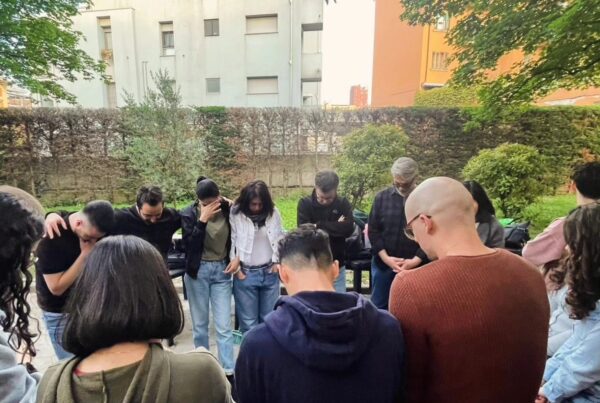Last year, I started wearing one of those devices that tracks your sleep. In the morning, it tells you how well your body is recovering from the day’s stressors. Green means you allowed your body to recover adequately; yellow, recover moderately; and red, well, yikes. It became readily clear that I didn’t have enough greens.
I think most of us would acknowledge that we don’t get enough sleep. But that acknowledgment is often done with an air of levity—or even resignation. We’ll quip about being tired and needing more coffee with the underlying assumption that being deprived of sleep is a normal part of existence.
We need to push past the resignation and examine whether or not our chronic tiredness reveals a deeper issue. To be sure, our amount of sleep can be affected by our circumstances. But I think we also need to consider if that’s due to an underdeveloped view of sleep itself and the role it has in our lives as image bearers of God and followers of Jesus.
Here are four perspectives that might help us see just how merciful of a gift sleep really is.
1. Sleep is an act of stewardship.
Usually, the more valuable a gift, the more intentional you are in caring for it. A broken screen on your brand-new iPhone Christmas gift stings a bit more than one on the old phone you’ve had for years.
God designed and gave us our bodies as incredible gifts worthy of our care and attention (Ps 139:14). Faithful living as embodied souls means, at least in part, honoring our physiology. It means understanding—and meeting—the needs of our bodies.
Myriad studies show the necessity of sleep. Sleep quality and quantity are directly linked to blood pressure, blood sugar levels, immune system efficacy, memory preservation, and overall cognitive performance. To use a stark example, there’s a nationwide 24% increase in heart attacks the day after daylight savings time takes an hour of sleep from us. And the night when it shifts back and we all gain an hour? A 21% reduction in heart attacks the next day. We should rest well at night not because of our performance that day, but because of what awaits us from our Savior in the morning: fresh mercies. Click To Tweet
I don’t think any of us would refute that more sleep equals healthier bodies. But we need to be honest with ourselves and admit that neglecting sleep, therefore, is refusing to steward the incredible gift God has given us. But physiological benefits aren’t the only reasons we should get more sleep. Prioritizing sleep also shapes us spiritually.
2. Sleep is an act of humility.
Charles Spurgeon said, “God gave us sleep to remind us we aren’t him.” When we go to sleep, whether we’re cognizant of it or not, we’re embracing our limitations. Think about it: when you’re asleep, you’re pretty much worthless. You can’t do anything else. Therefore, the act of consciously choosing to go to sleep—even when the to-do list isn’t finished—is a way of saying to our hearts, “You are creature, not Creator.”
From the beginning, the Enemy has said, “You can be like God.” This falsehood sits at the root of sin itself. And one of the most tangible ways Satan convinces people of that lie is by getting them to think that they, like God, are without limits—that they can do it all. So when the Serpent whispers in my ear, “You can be like God,” laying my head down on the pillow and intentionally going unconscious for a third of the day is a very practical, humbling way of saying back, “No, I really can’t.”
3. Sleep is an act of trust.
If going to sleep is saying, “I can’t do it all,” it’s also an opportunity to say, “and I don’t have to.” When we go to sleep, we’re trusting God with all that’s left undone. We’re handing him all our cares and the cares of those in our lives. “I am going to stop working, God, and I trust that your work will continue.” We can rest because God does not need to rest. We can leave things unfinished because God never does. Click To Tweet
Of course, this doesn’t mean we should lazily neglect our responsibilities. Sometimes it’s appropriate to burn the midnight oil; we shouldn’t be opposed to a righteous tiredness every once in a while. But our temptation is usually the other way: to consider ourselves more essential to the survival and spread of the gospel than we really are.
Psalm 127:2 says,
It is in vain that you rise up early
and go late to rest,
eating the bread of anxious toil;
for he gives to his beloved sleep.
God reminds us that our endless toil isn’t necessary. It’s a sweet thing to come to grips with the reality that God does not, in fact, need us. Sleep is a way to put that belief into practice and to teach our hearts to believe it, as well. We can rest because God does not need to rest. We can leave things unfinished because God never does. As Victor Hugo said, “Go to sleep in peace. God is awake.”
4. Sleep is an act of faith and repentance.
Perhaps some of the sweetest verses in Scripture are Lamentations 3:22–23:
The steadfast love of the Lord never ceases;
his mercies never come to an end;
they are new every morning;
great is your faithfulness. (my emphasis)
When we go to sleep, we’re leaving today’s sins and shortcomings where they belong and anticipating the fresh mercies of God. Each time we go to bed and wake up, we’re rehearsing the death of our old self and the putting on—or raising to life—of our new self. Each night is a crude reflection of the death, burial, and resurrection that we participate in through our union with Christ.
We should rest well at night not because of our performance that day, but because of what awaits us from our Savior in the morning: fresh mercies. To lay down to sleep is to have faith in those mercies, to lean wholly on them, and then to step more and more into our new life in Christ each morning.










